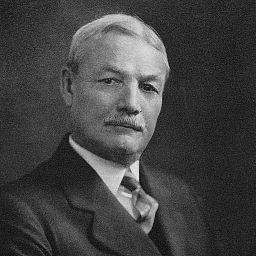Presidential Address (1924)
Presidential Address (1925)
The American Revolution: An Interpretation
In Memoriam
From the American Historical Review 49:2 (January 1944)
Charles McLean Andrews (February 22, 1863–September 9, 1943), acting President of the American Historical Association in 1924 and President in 1925, died in New Haven on September 9, 1943, in his eighty-first year, after a short illness. He was born in Wethersfield, Connecticut, and educated at Trinity College, Hartford, and at Johns Hopkins. It was appropriate that, as a native of one of the earliest Connecticut towns and a direct descendant in the seventh generation of pioneer settlers of that colony, he should have written his doctoral dissertation on The River Towns of Connecticut (1889) and then gone on to devote the major part of his life to the study and interpretation of American colonial history. He became convinced that the most fruitful approach to a historical period was through its institutions and that the colonies could be understood only when placed against the English background. These two principles underlay nearly all his writing. Among the twenty-eight volumes and sixty articles which he produced he himself considered almost his most important contributions to be three volumes of guides to the materials for early American history in British archives, published by the Carnegie Institution. Not only did they give other investigators invaluable tools, but the writing of the introductions to the various departmental sections of these volumes also compelled him to break new ground in studying the history and functioning of the various British agencies of colonial administration. Mr. Andrews will probably be best remembered for his Colonial Background of the American Revolution (1924), a group of four interpretive essays, and for his Colonial Period of American History (1934–38). Four volumes of the latter work appeared, written, all of them, after his retirement, three on the settlements and one on British commercial and colonial policy. When the first volume appeared it was awarded the Pulitzer Prize. He planned but did not complete three others, on the social and economic growth of the colonies, on their political and institutional development, and on the Anglo-American conflict. In the volumes published the emphasis lies on the essentially colonial nature of early American history and on the institutions of settlement and administration. At the time of his death he was engaged in editing with his wife The Journal of Jonathan Dickinson. This volume will shortly be published. During his forty-four years of teaching at Bryn Mawr, Johns Hopkins, and Yale he was as much interested in the training of younger scholars as he was in his own writing; and he had a profound influence upon a large group, not only of his own students, who were devoted to him personally, but also of young men and women generally who came to him for help and guidance.
Bibliography
The river towns of Connecticut: a study of Wethersfield, Hartford, and Windsor, by Charles M. Andrews. Baltimore: Publication Agency of the Johns Hopkins University, 1889.
The historical development of modern Europe, from the Congress of Vienna to the present time, 1815–1897, by Charles M. Andrews. 2 vols. New York and London: G. P. Putnam’s sons 1900.
Colonial self-government, 1652–1689, by Charles McLean Andrews. New York: Harper & brothers, 1904; Reprint, St. Clair Shores, Mich.: Scholarly Press, 1969.
British committees, commissions, and councils of trade and plantations, 1622–1675, by Charles M. Andrews. Baltimore, The Johns Hopkins Press, 1908.
A short history of England, by Charles M. Andrews. Boston, Allyn and Bacon, 1921.
The Boston merchants and the non-importation movement, by Charles M. Andrews. Cambridge: J. Wilson and son, 1917.
Colonial folkways; a chronicle of American life in the reign of the Georges, by Charles M. Andrews. New Haven: Yale University Press, 1919.
The fathers of New England; a chronicle of the Puritan commonwealths, by Charles M. Andrews. New Haven, Yale University Press, 1919; Reprint, New York: United States Publishers Association, 1978
The colonial background of the American Revolution; four essays in American Colonial history, by Charles M. Andrews. Rev. ed. New Haven: Yale university press, 1931.
